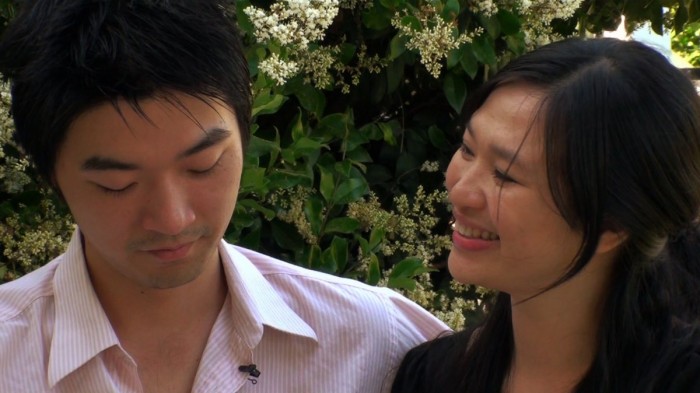By Jessica Duncanson
Director: Wu Wuna
Watch Let’s Fall in Love on FilmDoo.com
Prince charming, star-crossed lovers, love at first sight; these are things that we as audiences have been spoon-fed continuously in film and literature. However, as many of us know, real life rarely works in such a way. In Let’s Fall in Love, Wu Wuna tries to get to the crux of what makes a successful marriage and even attempts to understand romantic love itself. As can be said of love, the film is an intricate mix of melodrama, tragedy and comedy.
The documentary begins with shots of various couples talking about what irritates them about each other. Although they have been encouraged to do so by the filmmaker, the conversations quickly turn bitter and feel all too real. We soon discover that many partners were initially reluctant to marry in the first place, especially the male partners, but that matchmaker Ms. Chen had worked to seal the deal. The women in the documentary are shown to be generally more eager to marry, a trend that reveals certain cultural specificities, principally society’s often marriage obsessed mind-set. The Chinese term shengnu, for example, is a derogatory term referring to an unmarried woman past her late twenties. The term can be translated as ‘leftover woman’ and implies that a woman is past her prime and has failed to lock down a husband. This societal pressure appears to lead to impulsive and practically arranged marriages which are likely to often be bad choices seeing as the documentary points out that Taiwan has the highest divorce rate in Asia.

Interestingly, while these cultural aspects may initially seem surprising, the emotional marital struggles and frustrations voiced by the couples do in fact feel universal. What’s more, the bustling setting of Taipei portrays common difficulties of urban romance. Therefore, in the age of the normalisation of more untraditional dating methods such as online dating and apps, perhaps the hiring of matchmaker Ms. Chen isn’t as bizarre as it may initially seem to some. Ms. Chen, Wu’s narration tells us, has specialised in marketing, a field that is inextricably linked to the way that we publicise ourselves on social media and dating sites. Ms. Chen is certainly the star of the documentary. Intense, talkative and always honest, she comes across as a kind of omniscient agony aunt. While her own personal life -which may have been interesting to have explored – is left largely uncovered, this mystery may in fact work to enhance her already powerful presence.
In terms of style, much of the documentary has a fly-on-the-wall feel, often making its audience feel like a voyeur invading on incredibly personal conversations. Once Wu seeks Ms. Chen’s help herself, however, to some extent the gazer becomes the gazed at. Wu admits that her own love life has been troubled and that she still has feelings for her ex-boyfriend. She also confesses that the marriages of many of her friends have left her feeling somewhat jealous of their happiness. Therefore, she turns to Ms. Chen for help. The ever-blunt Ms. Chen meets with Wu’s ex-boyfriend, concluding that the relationship is hopeless, Sisyphean even. Ms. Chen does not solve Wu’s romantic issues, however we suspect that Wu may not be ready. Wu’s narration tells us that film critics have commented that her filming of weddings shows her fear of marriage. In many ways this documentary proves that these fears are certainly justified.
Overall, however, the documentary is a hopeful portrayal of redemption and the power of forgiveness and acceptance. Ms. Chen is shown talking with a couple that have struggled with the female partner’s emotional infidelity. Her husband, however, has decided to forgive her and their heart-warming solidarity restores faith in the power of forgiveness. In a principally realist documentary, one of the only stylistic elements is a reversed shot of decaying roses, solidifying the message that we can mend what is broken. We are reminded that marriage is not ‘like a washing machine with a lifetime warranty’ as one man in the film describes it, but rather an unpredictable journey in which we must all learn to eradicate our blind idealism and accept the inevitable imperfections of our partners.
Watch Let’s Fall in Love on FilmDoo.com
FilmDoo Also Recommends:









Really interesting read, never heard of this film before but may check it out!